Le vent d'est Blu-ray Movie
HomeLe vent d'est Blu-ray Movie 
Wind from the EastArrow | 1970 | 95 min | Not rated | No Release Date
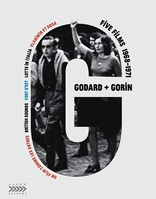
Price
Movie rating
6.5 | / 10 |
Blu-ray rating
| Users | 0.0 | |
| Reviewer | 3.0 | |
| Overall | 3.0 |
Overview
Le vent d'est (1970)
Described by its creators as a Marxist Western; however it is more a film about the making of a film, mixing elements of fact with fiction, or recreation with documentary.
Director: Jean-Luc Godard| Foreign | 100% |
| Drama | 82% |
Specifications
Video
Video codec: MPEG-4 AVC
Video resolution: 1080p
Aspect ratio: 1.33:1
Original aspect ratio: 1.37:1
Audio
French: LPCM Mono
Subtitles
English SDH
Discs
Blu-ray Disc
Single disc (1 BD)
Playback
Region A (B, C untested)
Review
Rating summary
| Movie | 3.0 | |
| Video | 4.0 | |
| Audio | 3.5 | |
| Extras | 0.5 | |
| Overall | 3.0 |
Le vent d'est Blu-ray Movie Review
Reviewed by Jeffrey Kauffman March 10, 2018Note: This film is available as part of the box set Jean-Luc Godard + Jean-Pierre Gorin: Five Films, 1968-1971.
If you were asked to name just one film by iconic director Jean-Luc Godard, which one would you choose? Chances are for many of you it would
probably be his legendary pioneering New Wave entry Breathless,
or perhaps one of his better remembered titles from a bit later in his career like Alphaville or Masculin Féminin
.
Even if your particular choice wouldn’t in fact be one of these three films, this very trio in and of itself proves quite admirably how widely variant
the
content in Godard’s films can be, even if his style is often instantly recognizable. As perhaps evidenced by the title of what is the last film Godard
has
come out with (he’s still alive and kicking at 87 as this review is being written), 2014’s Goodbye to Language, Godard is often interested in the visceral intensity of imagery, imagery that is often either
divorced or at least tangentially related to any perceived content. In our recent Faces Places Blu-ray review, a film which has both subliminal and overt references to Jean-Luc Godard, I jokingly
referred to the five films in this set as among the "vaguest" of the Nouvelle Vague. In fact what is repeatedly so fascinating about these
five
admittedly odd films is how their presentational aspects are almost deliberately opaque, while some of their actual content is virtually screed like,
as Godard, probably already prone toward anarchistic tendencies, tipped over into what some have called "radicalization" in the wake of
sociopolitical unrest in the France of the late sixties.
It's a sometimes discomfiting mix, one that Godard and Gorin no doubt concocted intentionally, but it makes each of this quintet a rather peculiar
viewing experience at times.
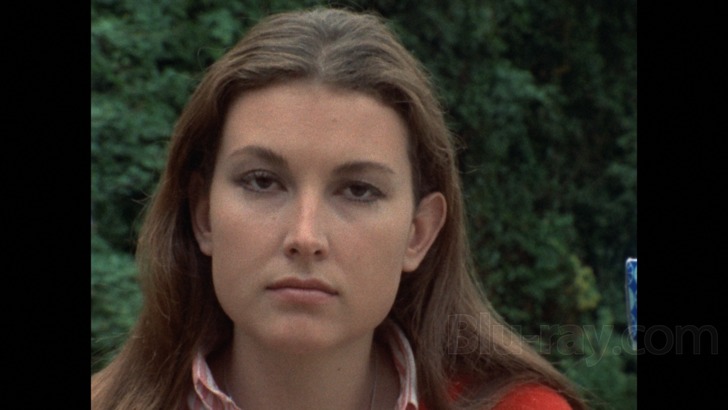
Le vent d’est (Wind From the East) may simultaneously be the most straightforward and the most discursive film in this set, another testament to the deliberately provocative approach Godard, Gorin and the Dziga Vertov collective preferred to take. Narratively, there’s actually a bona fide story here, at least relatively speaking (and especially compared to some of the more “static” films offered in this set). With what might be perceived as yet another use of Marxist or at least quasi-Marxist ideology, Le vent d’est attempts to deconstruct and analyze a strike, though even this underlying element turns out to be just one example of what might be thought of as the central focus of the film: upstarts versus authoritarians or those who are in (or who think they are in) control. That said, while the content here is at least discernable (even as the film goes off into a number of patently odd detours, including the very art of filmmaking), once again both presentational and sound design elements are jumbled in a way to arguably intentionally confuse the viewer (and listener).
From a visual standpoint, the film veers off into the near surreal, with a number of characters donning what looks like Victorian era duds and wandering through a forest glade, even as the soundtrack continues to offer a polemical screed with competing views often voiced simultaneously. In fact, it’s this film’s incredibly dense soundtrack that may be its most distinctive feature. In what might be thought of as Howard Hawks on steroids, Godard and Gorin don’t just offer a couple of characters with a few overlapping bits of dialogue, they devote whole huge swaths of this film to what sounds like every character opining at the same time.
You can almost feel Godard (and by inference, Gorin) struggling against the strictures not just of society in general, but even of the traditions of filmmaking in particular, which Godard perhaps sees as having given way to the same machinated, soulless environment as workers in more ostensibly mundane walks of life. There’s a refracted, reflective quality to Le vent d’est, which finds the filmmakers questioning not just the content that they themselves are presenting, but even how in fact they’re presenting it.
Le vent d'est Blu-ray Movie, Video Quality 
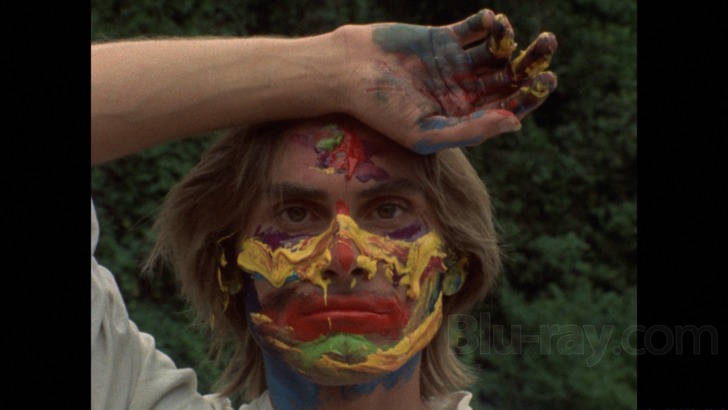
All of the features included in Jean-Luc Godard + Jean-Pierre Gorin: Five Films, 1968-1971 are presented on Blu-ray courtesy of Arrow Academy with AVC encoded 1080p transfers in 1.33:1. Arrow's insert booklet contains only some very basic information on the transfers, stating:
The films in this collection were restored from the original film and audio elements by Gaumont. The presentations of these films are in keeping with their original 16mm original productions.Le vent d'est has a few minor issues with regard to some slight damage like warped frames, but overall looks great, with an appealingly organic grain field and a really nice reproduction of a rather vivid palette. Elements like the thick, gooey face paint the actors swirl over their faces really pop with considerable power, though some of the wider shots in fields actually can look just slightly anemic at times, especially in terms of the greens. There are some interesting stylistic choices here, especially toward the end of the film, where Godard and Gorin deliberately "scratch" frames until everything simply dissolves into a static red frame. A bit later, what look like big holes cut out of individual frames accrue. As with some of the other titles in this set, reds can occasionally skew slightly toward orange territory, something that's noticeable in things like the Communist posters that are featured.
Le vent d'est Blu-ray Movie, Audio Quality 

While any variances are really a matter of perhaps niggling degrees, I'm giving Le vent d'est's LPCM Mono track (in French) a slightly lower score than some of the others in this set due to intermittent but noticeable background hiss at times, as well as an occasional boxiness to voiceover. Some other elements, like a halting recorder solo late in the film, actually sound nicely clear and distortion free. Fidelity is generally fine, if a bit more variant than on some of the other releases in the set, and all of the dialogue and voiceover comes through fine.
Le vent d'est Blu-ray Movie, Special Features and Extras 
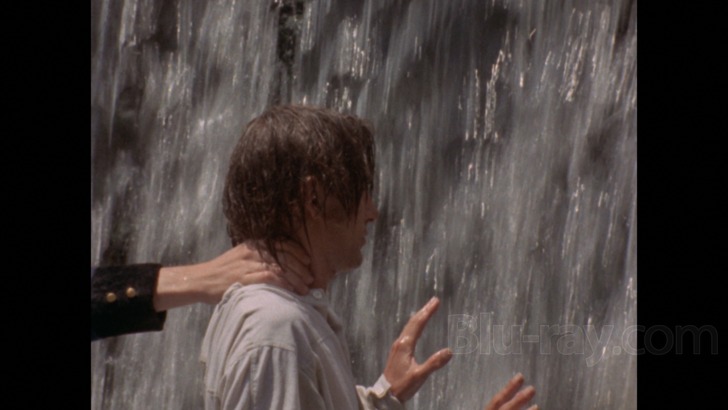
Both Le vent d'est and Lotte in Italia are contained on the same Blu-ray disc. That disc features the following supplement:
- Schick After Shave Advertisement (1080p; 00:59) is a completely peculiar spot that seems to suggest wife (or girlfriend) beating can be ameliorated with just a little Schick After Shave. The fact that Godard would bow to the forces of Capitalism and produce a marketing piece is fascinating enough, but the spot itself is really bizarre. I'd love for there to be an actual documentary on this aspect of Godard's career, as it seems almost willfully antithetical to the political aims he was so intent on achieving.
Le vent d'est Blu-ray Movie, Overall Score and Recommendation 
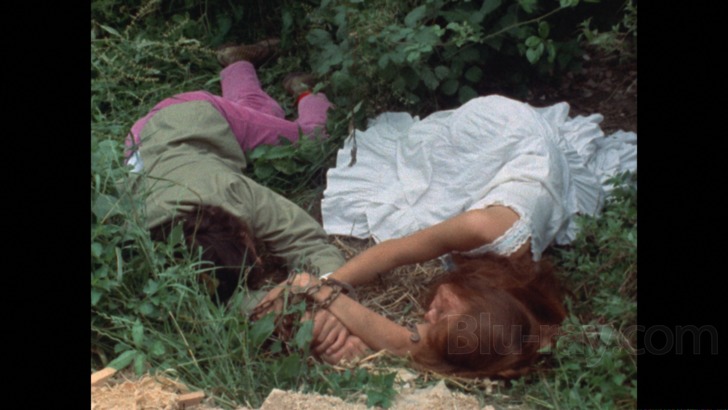
Le vent d'est is in some ways the most screed like film in this set (and that's saying quite a lot), especially with regard to the deconstructionist tendencies offered about the history of film (it's almost unbelievably fascinating to hear Godard taking Eisenstein to task for being a "tool" of the bourgeoisie). As with the other films in this set, though, getting to the (perceived?) content can be a bit of an obstacle course. Technical merits are generally first rate, but I found the audio just a little less fulsome on this release than on some of the others in this set.
Similar titles
Similar titles you might also like
(Still not reliable for this title)

Un film comme les autres
A Film Like Any Other
1968

Lotte in Italia
Struggle in Italy
1971

Vladimir et Rosa
Vladimir and Rosa
1971

British Sounds
See You at Mao
1969

A Ship to India
Skepp till Indialand / A Ship Bound for India
1947

Dreams
Kvinnodröm
1955

Sawdust and Tinsel
Gycklarnas afton
1953

Brink of Life
Nära livet
1958

The Passion of Anna
En passion
1969

The Silence
Tystnaden
1963

Wild Strawberries
Smultronstället
1957

24 Frames
2017

Porcile
1969

Cries and Whispers
Viskningar och rop
1972

Drive My Car
ドライブ・マイ・カー / Doraibu mai kâ
2021

After the Rehearsal
Efter repetitionen
1984

The Rite
Riten / The Ritual
1969

The Night of the Shooting Stars
La notte di San Lorenzo
1982

Thirst
Törst
1949

Panique
Panic
1946